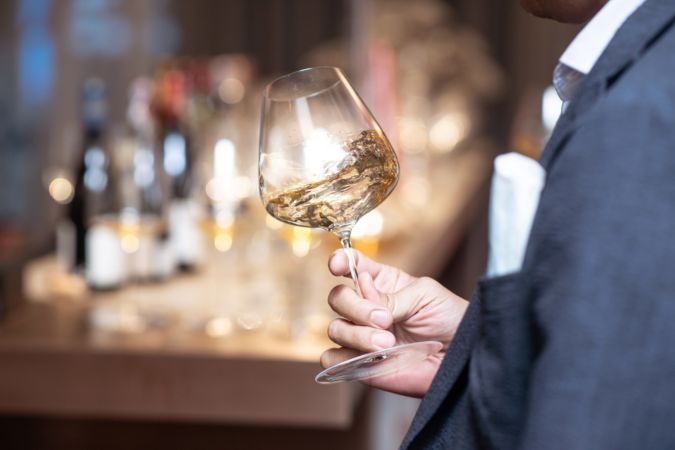In our Ask the Sommelier series, we’re putting readers’ wine questions to the world’s top sommeliers. In this instalment, independent sommelier, Director of Wine at Ten Trinity Square and IWSC judge, Jan Konetzki, offers his advice to a reader trying to grasp how and when to decant a wine.
‘I’m wondering when should I decant wine? Is it a good idea to decant all reds, or are there only specific bottles that will benefit from the process? What about whites and sparkling wines? And once decanted, how long should I leave the wine before drinking it?’
Stephen from Edinburgh

Sommelier Jan Konetzki responds:
‘Decanting wine became fashionable back in the 17th century as a way for people to serve wine from decorated cradles, instead of from the bottle. While in the beginning it was done for fashion, now it is a tool to bring the wine to its best performance, as well as to bring out the enjoyment.’

When should you decant red wine?
‘Usually there are two reasons to decant wine: reason one would be for when you have an older wine. The majority of older red wines – let’s say five-years-plus – develop a deposit. That’s when the tannins and the colour break down into a sediment that can sometimes be powdery, sandy, or even slimy. In very old wines, let’s say 20-years-plus, they develop that sediment but they also become a little bit more fragile in the way they react to air. You want to remove the wine from its sediment but you don’t want to give it too much air, so you would usually use a smaller cradle – that way you don’t run the risk of letting off the fireworks of flavours and aromas when nobody’s there to watch them.
‘The other reason for decanting wine is when opening a young, fine, artisanal wine. Usually, if they have a little bit more tannin or oak ageing, you want to use one of those big decanters where the wine makes a lot of waves so that it can oxidise and breathe, the tannins can soften and the aromas can develop. These young, robust wines really need a rollercoaster of movement to open them up. For a First Growth or Second Growth, a top Barolo or Barbaresco, plus top wines from Tuscany or the Napa Valley, when they’re young, I sometimes double-decant them [pour twice, often from bottle to decanter and back again], just to make sure they’re ready to perform.
‘If you’re looking for a shortcut to decanting wine, try this: if your wine is quite deep in colour or has quite a lot of high-scoring points from a critic, at the end of five years, it’s very likely that it’ll benefit from half an hour in a carafe, because usually, the amount of tannin is related to the depth of colour to the wine.’

When should you decant white wine?
‘When it comes to young, white wines, or artisanal, fine white wines – especially those with high acidity and oak ageing – they can benefit from decanting in the same way because they’re so complex when they’re young. What’s important, especially for sparkling wine and Champagne, is to use quite a small, narrow decanter – and don’t forget to pre-chill, because if you don’t, all the bubbles will be out and the Champagne will be flat when you serve it.’
Observing a wine opening up is a bit like listening to an album
What style of decanter is the best investment?
‘A very good glass is the best investment for a wine lover. Above that, a decanter, a big jug or something where a wine can move around is what you need. Even if you drink a small amount of wine at home, it’s good to have a small jug or a carafe handy to move the wine around until it has the right flavour for you.’
How long should you leave a wine after decanting it?
‘Generally, you would see quite quick results if you decant a wine – within 15 to 20 minutes – but at a Château Latour tasting, we would usually carafe the wines for at least an hour before we would serve them. Sometimes gentleness and giving something time to slowly open up benefits a fine wine.
‘Personally, I really enjoy observing the process of a wine opening up. It’s a bit like listening to an album. And you have a lot more freedom to play with the wines at home than we do as sommeliers in a restaurant. If you have one of these younger red wines that you love, maybe you decant half of the bottle and then go away for 15 to 30 minutes. Then, compare the taste of these two wines. This will build up your knowledge and empower you to make educated choices with the wines you like. The key to decanting wine is for people to overcome the fear of doing something wrong.’
Interview by Laura Richards
Note: this article was first published 9 June 2021 and updated on 19 December 2022
Do you have a question to put to the world’s top sommeliers? Send them to editor@cluboenologique.com







